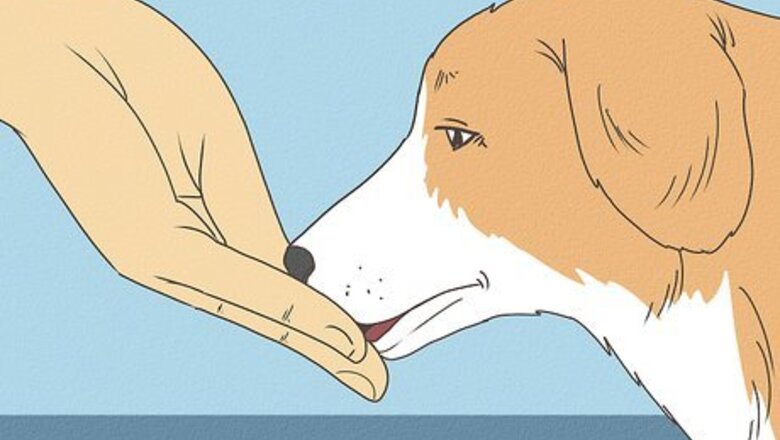
views
X
Research source
The Happy Puppy. Pippa Mattinson. Ebury Press
Fostering a Healthy Relationship With Your Dog
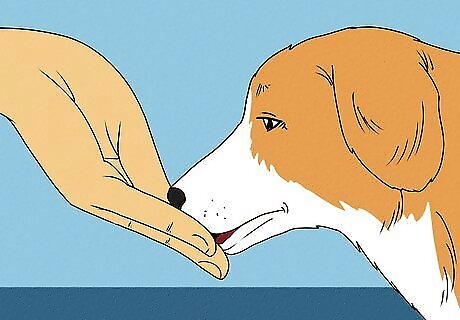
Know how to nurture your dog. Create rules and enforce them to show your dog that you love him. Rules and expectations will help your dog know what behavior is acceptable and what isn't. This way he won't have to worry about when he may or may not get in trouble. Your dog will know he's loved, because he feels safe in the knowledge that you're in charge and taking care of him. Part of nurturing your dog is rewarding your dog's good behavior with food, attention, or play, and knowing how to correct bad behavior. This way, he won't repeat the action.
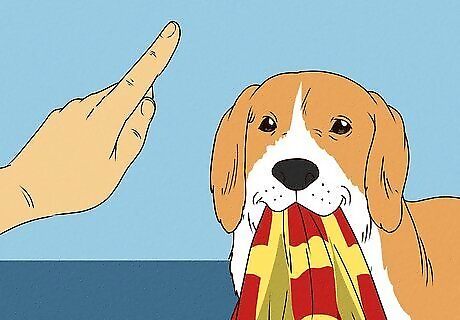
Recognize the importance of boundaries. Since your dog will share your home, he needs to understand your rules and expectations, such as where to toilet, not chewing furniture, and not stealing food off of the table. If you don't set limits, your dog will find yours by doing something that upsets you. Setting boundaries also helps him cope with the outside world, making him less likely to act out dangerously. For example, if you don't set boundaries, don't be surprised if your dog one day tries to bite your partner or chews your favorite designer handbag.
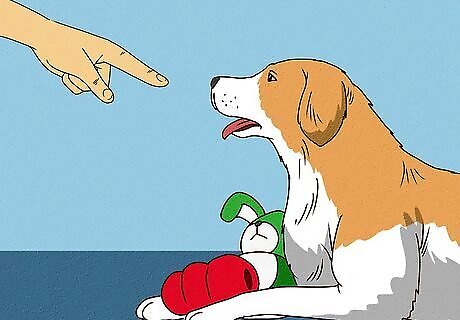
Consistently enforce rules. When you notice your dog breaking a rule, don't just ignore it sometimes and enforce it other times. This will send a confusing message to your dog, so that when you do correct him, he'll become conflicted and distressed. He may even challenge you by growling or attempting to bite. For example, if your dog is breaking a "no dog on the sofa" rule, distract him so he jumps down, then reward the good behavior of getting down. You may distract him by playing with his favorite toy or dropping a treat on the floor. If the dog disobeys you again, you may need to put a leash on him in the house to keep him off the sofa. Or, you may need to put him out of the room, withdrawing attention.
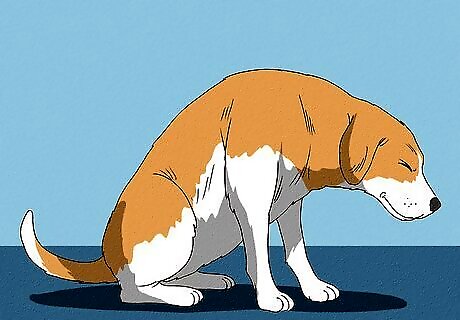
Read your dog's body language. Start paying attention to your dog's body language in order to understand your dog better and what he's trying to tell you. For example, pay attention to signs that your dog feels uncomfortable. His head will lower, he'll glance away, cower down, and tuck his tail low. This will tell you that he's stressed and help you respond to his discomfort. By understanding how your dog feels, you can react appropriately by removing the dog from what's scaring him, distracting him with some training exercises, or backing away and reducing the pressure on your dog.

Cherish your dog. Always respect your dog and the love that your dog has brought into the house. Be kind, caring and considerate in the way that you treat your dog. Your dog is a family member. Dogs read a lot into your tone of voice, so speak kindly to him and he will understand your intentions. Make your dog feel secure by never fighting with your family in front of the dog. Watching an argument may distress him.

Spend quality time talking with your dog. Your dog loves getting attention from you. Every day, set aside some time to spend with your dog, even if you're just watching TV together or stroking your dog's ears and resting. Make sure to talk to him, which will help develop your own language together. You might also encourage your kids or family members to read to your dog. Don't forget to rub, scratch, or massage your dog's tummy. This is a great way to show your love. If your dog puts his head in your lap, it's not because he wants you to scratch behind his ears. He's actually trying to figure out where you've been, who you've been with, and what you just ate.
Creating a Safe and Healthy Environment

Establish a routine. Routines give a dog a sense of stability,which makes them feel more secure. He doesn't have to worry about future meals or walks because they always occur at set times. In a dog's world, routine means knowing what time he gets up, goes for a walk, has his meals, and when he's groomed. Having those things happen at a predictable time shows your love for your pet. Experts believe that a grieving or depressed dog can be cheered up by enforcing a routine rather than deviating from it.
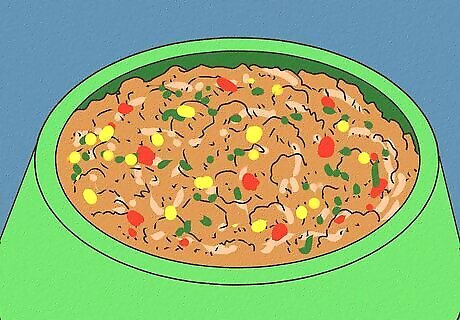
Feed your dog a nutritious diet. While your dog may enjoy treats, this doesn't mean he should always get them, instead of nutritious food. Instead, talk with your veterinarian about recommending a healthy dog food and correct amount to feed your dog. This way, your dog gets the vitamins and minerals he needs to thrive. By caring for your dog's health and only occasionally rewarding him with treats, you show him that you care.
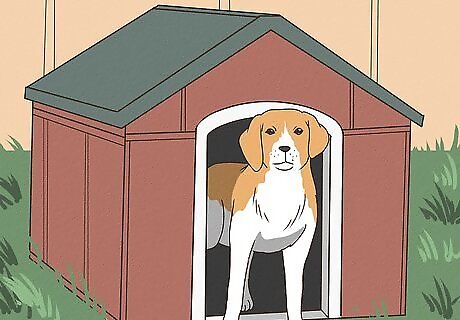
Give your dog a comfortable place of his own. Make sure your dog has his own sleeping area that's set out of the way of people or storage. This will give your dog a space to withdraw to if he's simply had enough and needs to relax or calm down. He should have a den or safe place that contains a comfortable bed.
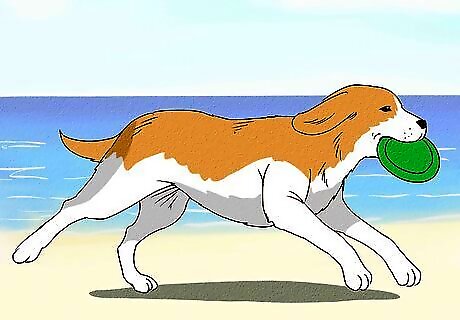
Give your dog plenty of exercise. Depending on your dog's breed, being cooped up could potentially drive him crazy. Working and herding dogs typically have a lot of energy, and that energy needs to go somewhere productive and fun. Play fetch to get your dog running around or go for a walk (or jog, if you both like a challenge). Walks also give a dog a chance to see their world and sniff around as dogs naturally do. A well-exercised dog is a fulfilled dog, who is far less like to have behavioral issues such as destructiveness or disobedience. Small dogs have a lot of energy, but it is quickly used up. A short walk should give a small dog enough exercise for the day. Dogs with thicker builds are typically more sedentary and will be less interested in exercise. Still, it's good to get them outside once in a while.
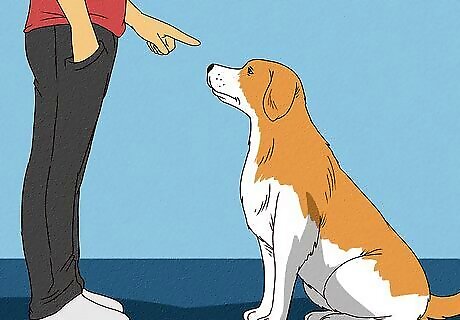
Have regular training sessions. Look into reward-based training programs. Try to do two 10 to 20 minute training sessions every day and make them fun. If your dog doesn't already know them, start with the basics like, "sit," "stay," and "come." Your dog will love earning rewards and showing off his skills to other people when he learns a trick. Training keeps dogs mentally stimulated and is a great chance for some one-on-one attention, which they love. Keeping your dog mentally active is a great way to show you love him, because it adds purpose and stimulation to his life, and helps him look forward to each day.

Reward your dog. Let your dog know he's behaving well by rewarding him with small food treats, extra praise, or a game with a favorite toy. If you give food treats, choose ones that are healthy and made specially for dogs. Or, you can make them at home. Remember to immediately reward the dog for good behavior so that he makes a positive association with the action.




















Comments
0 comment